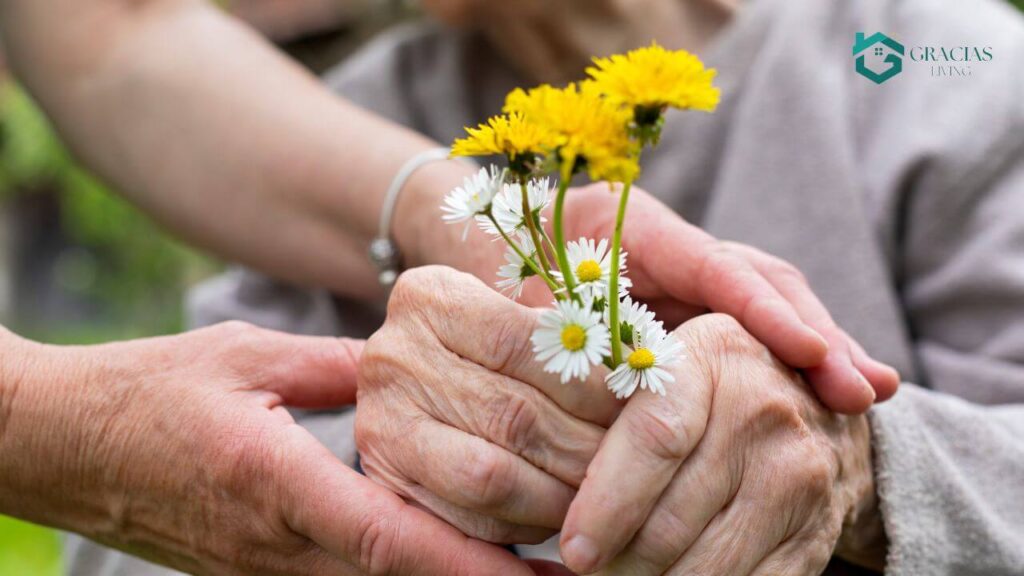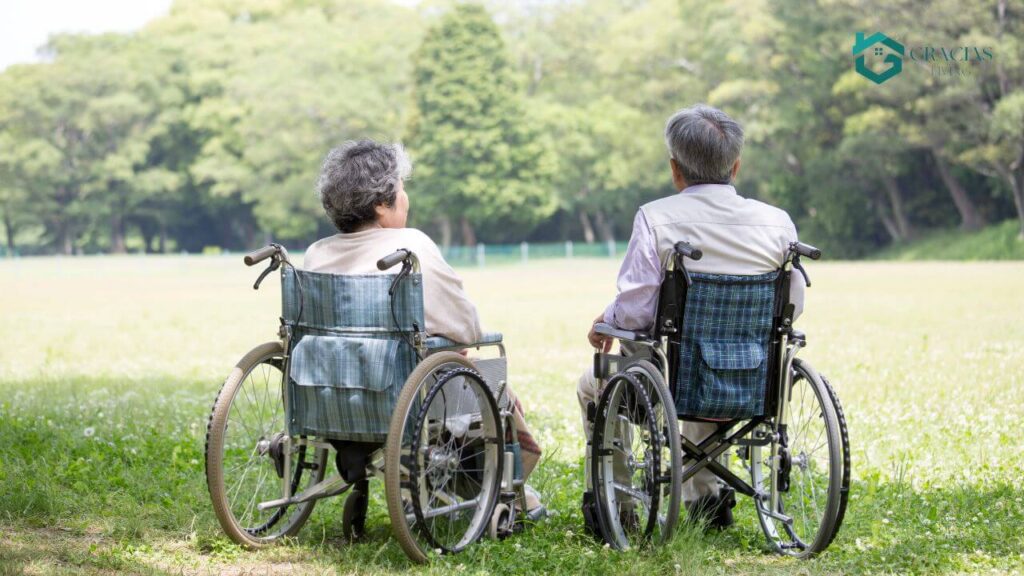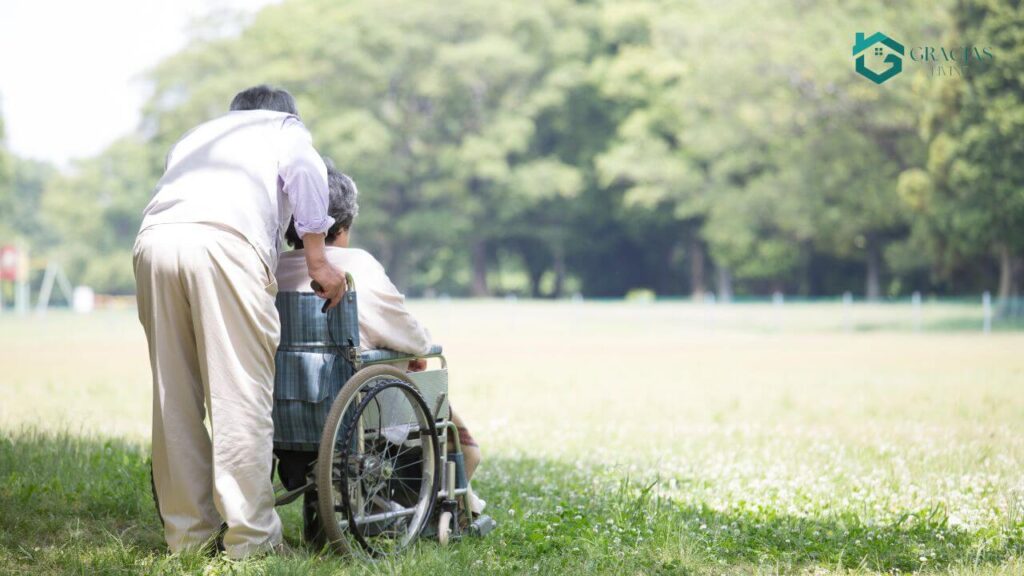Quick Summary of the article:
- Taking care of Elderly includes ensuring they’re safe, healthy, and happy, and helping them with everyday tasks
- Caring for an elderly loved one is a noble and rewarding responsibility. It is a beautiful journey filled with love, compassion, and precious moments.
- Ensure a safe and secure living space for your loved ones. Your care and dedication make a world of difference in the lives of old people.
- As a Caregiver, you also need to rest and take care of yourself.
Caring for an elderly person involves looking after them with kindness and understanding.
It includes ensuring they’re safe, healthy, and happy, and helping them with everyday tasks. It’s not just about meeting their basic needs; it’s about enhancing their overall well-being and quality of life.
When caring for an older person, you must be patient and understanding. They might move slower or need more help than they used to, and that’s okay. We have to ensure they feel comfortable and supported.
Caring for an elderly person is a rewarding responsibility. By providing love and support, you can help them enjoy a better quality of life.

Tips for Providing Care to the Old Age Person
Here are some essential tips to help you provide the best possible care for your aging family member:
1. Create a Safe Environment
Create a safe living space for the elderly to prevent accidents and injuries. Remove hazards such as loose rugs or cords, install grab bars in common areas and bathrooms, and ensure there is adequate lighting throughout the house.
2. Provide Nutritious Meals
Offer balanced meals rich in nutrients and hydration. Consider any dietary restrictions or preferences and ensure they have fresh fruits, vegetables, lean proteins, and whole grains.
3. Encourage Physical Activity
Physical activity is vital for maintaining strength, flexibility, and mobility. Adapt exercises to their abilities, such as gentle walks, and chair yoga. Regular movement helps improve circulation, joint health, and overall well-being.
4. Promote Mental Stimulation
Engage in activities that keep the mind sharp and stimulated. Have meaningful conversations, solve puzzles together, read books or newspapers, or encourage hobbies they enjoy. Mental stimulation can help prevent cognitive decline and enhance mood.
5. Ensure Medication Compliance
Set up a system to organize and remind them to take their medications as prescribed. Use pill organizers, medication schedules, or electronic reminders to ensure they stay on track with their medication regimen.
6. Maintain Personal Hygiene
Assist with personal hygiene tasks such as bathing, grooming, and toileting as needed. Respect their dignity and privacy while helping them maintain cleanliness and comfort.
7. Foster Social Connections
Encourage visits from friends and family members, and facilitate social activities. Loneliness is daunting and can impact their mental and emotional well-being, so social connections are essential for their happiness.
8. Monitor Health
Schedule regular check-ups with doctors, and healthcare providers and keep track of any changes in their health. Be vigilant for signs of illness or discomfort, and address any concerns promptly.
9. Provide Emotional Support
Offer reassurance, empathy, and companionship. Listen attentively to their concerns and feelings, and provide emotional support during challenging times. Caring and supportive words can make a huge difference in their emotional well-being.
10. Respect Their Wishes
Involve them in decisions about their care and honor their preferences. Respect their autonomy and choices, whether it’s related to their daily routines, medical treatments, or end-of-life wishes.

Benefits of Taking Care of an Elderly Person
Taking care of an elderly loved one involves significant effort, but there are many benefits attached to it. Here are ten benefits of providing care for an older family member:
1. Improved Physical Health
Regular medical check-ups, physical therapy, and proper medication management contribute to well-being, allowing them to maintain independence and enjoy a better quality of life.
2. Enhanced Mental Health
Engaging in activities, socializing, and receiving emotional support reduce feelings of loneliness and depression, promoting mental well-being and happiness.
3. Safety Measures
Installing safety features like grab bars, removing tripping hazards, and ensuring adequate lighting minimize the risk of accidents, providing a safe and secure environment.
4. Healthy Nutrition
Providing balanced meals tailored to their dietary needs ensures they receive the essential nutrients for optimal health, strengthening their immune system and improving overall well-being.
5. Medication Management Systems
Using pill organizers, reminders, and assistance from caregivers ensures medication adherence, preventing missed doses and potential health complications.
6. Personal Care Assistance
Helping with bathing, grooming, and continence care maintains personal hygiene and dignity, fostering a sense of self-worth and confidence.
7. Social Engagement
Participating in group activities, outings, and spending time with friends and family members alleviate feelings of isolation, promoting social connections and a sense of belonging.
8. Financial Planning
Assisted Living with budgeting and accessing financial resources eases financial stress, providing peace of mind and stability.
9. Cognitive Stimulation
Engaging in brain games, puzzles, and memory exercises helps maintain cognitive function, preserving mental sharpness and memory.
10. End-of-Life Care
Open discussions and arrangements for end-of-life preferences ensure dignity and peace of mind, allowing them to make important decisions and have their wishes respected.

Care for the Care Giver: Caring for an elderly person can be demanding, so it’s crucial to prioritize your well-being too.
Taking care of yourself helps you be a better caregiver.
Take care of yourself while you’re looking after someone else. Here’s how you can look after yourself while looking after an elderly person:
1. Take Care of Yourself:
- Take Breaks: Make sure to take regular breaks to rest and relax.
- Stay Healthy: Eat well, exercise, and get enough sleep to keep your body and mind strong.
- Relax: Try relaxation activities like deep breathing, meditation, or yoga to reduce stress.
2. Talk About Your Feelings:
- Share Feelings: It’s okay to talk about how you feel. Find someone you trust to talk to.
- Get Help: Talk to a counselor or join a support group if you feel stressed or burnt out.
- Remember: You’re not alone, and it’s normal to feel overwhelmed sometimes.
3. Take Time Off:
- Get Help: Ask family or friends to help so you can take a break.
- Use Respite Care: Look into services that can give you a break from caregiving for a little while.
4. Learn and Get Support:
- Learn Skills: Learn to manage stress better with help and support.
- Join Workshops: Go to workshops or classes that teach you how to be a better caregiver.
5. Get Practical Help:
- Use Tools: Use tools or devices that can make caregiving tasks easier.
- Get Help at Home: Hire someone to help with chores or cooking.
6. Manage Money:
- Plan Finances: Figure out how to manage money for caregiving.
- Budget: Make a plan for spending money wisely.
7. Stay Healthy:
- Stay Healthy: Take care of your health. Follow your health routine regularly.
- Find Help: Go for medical help when you need it.
8. Stay Connected:
- Find Friends: Connect with others going through the same thing. It helps to have friends who understand.
- Go Out: Spend time with friends or doing things you enjoy.
9. Work Flexibly:
- Work and Care: If you work, see if you can change your hours or work from home sometimes.
- Get Help at Work: Ask your job if they have programs to help workers who are caregivers.
10. Feel Appreciated:
- Feel Good: Remember, what you’re doing is important. Take pride in your caregiving.
- Celebrate: Celebrate your achievements. You’re doing a great job!
Why Choose Gracias Living for Caring for an Old Age Person
Deciding where to place a parent or loved one in his or her older years is always a difficult decision. Families must know their relative is safe, secure and truly cared for. A senior living community can give them a feeling of security and the other important aspect, feeling home.
Because here is the truth — healthy aging is not about pills and plates. It’s respect. It’s dignity. And it’s creating a culture in which older adults are respected, involved, are part of something that is significant.
What distinguishes senior living is care on an individual level. Some residents need round-the-clock assistance. Some, however, simply need a little help from time to time. Either way, the pros are for you, dying to drop in with softness and respect. And daily life? It’s anything but routine. From workouts and craft classes to happy hours and shared experiences, the space ensures residents are engaged, active and happy. It’s not some cold, antiseptic place. Not a place of cold emptiness, but a place of warmth and laughter and life.
Conclusion
Caring for an elderly loved one is a noble and rewarding responsibility.
It is a beautiful journey filled with love, compassion, and precious moments. By showering them with kindness and support, we create cherished memories that will last a lifetime.
Your care and dedication make a world of difference in their lives.
Cherish the smiles, the laughter, and the love shared, knowing that you’re making their world a brighter and happier place.
Frequently Asked Questions
1. How can I make my home safer for an elderly person at home?
Small hacks go a long way. Non Slip mats, clear walkways, grab bars in the bathroom and proper lighting are easy measures that can go a long way in preventing accidents.
2. At what age does your face change most?
For most, though, the change is apparent in their 40’s and 50’s: skin sags, fat disappears, wrinkles abound.
3. What are common health issues in old age?
Things like osteoporosis, diabetes, arthritis and heart disease are common. But through exercising, eating right and regular checkups, those can be at bay.
4. How to support the mental health of an older person?
Fuel hobbies, deep convos and social connections. Even the barest of basics — quality time, really listening — can go a long way toward emotional health.
5. How to manage stress in an old age person?
Gardening, walking outside, listening to music or just engaging in a favourite hobby, all of it decreases stress. Lastly, regular contact with friends and family reminds them they are valued and loved.




